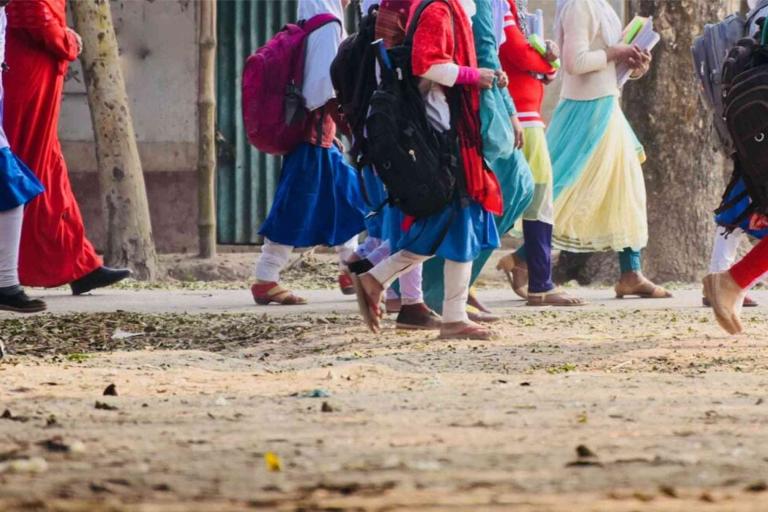Visionary leadership for comprehensive risk management is supporting resilience building in Bangladesh

Bangladesh is exposed to a range of natural hazards including tropical cyclones, monsoon and flash floods, storm surges, landslides, extreme temperature events, and droughts, which are exacerbated by climate change, as well as earthquakes. In 2023 alone, Bangladesh witnessed a surge in natural hazards and extreme weather events, including three cyclones affecting around 2.5 million people, and flash floods and landslides triggered by heavy monsoon rains affecting over 1.3 million people.[1] While investments in disaster preparedness and response have been prioritized, the wide-reaching impacts of climate change and disasters threaten to exacerbate social, political, and economic vulnerabilities. Reducing existing risk and preventing the creation of new risk is therefore a priority for sustainable development, as reflected in priority 3 'sustainable, healthy and resilient environment' of the United Nations Sustainable Development Cooperation Framework for 2022 to 2026. The work of the United Nations in Bangladesh has a strong focus on anticipatory interventions at the nexus of development and humanitarian programming to sustainably build resilience and address the underlying causes of vulnerability, while reinforcing national systems and capacities.
Under the leadership of the Resident Coordinator, the United Nations organizations take a comprehensive risk management approach to disaster risk reduction, climate change adaptation, and ecosystem health management, supporting the government and key non-state actors to coordinate and implement innovative, whole-of-society and gender-responsive initiatives, and build institutional capacity to improve ecosystem health and to better manage dynamic risks. The United Nations Resident Coordinator co-chairs, jointly with the Ministry of Disaster Management and Relief, the Humanitarian Coordination Task Team (HCTT), an effective coordination mechanism between government agencies and international partners, comprising the humanitarian clusters, aligning emergency responses with national disaster risk management strategies. In its co-chair role, the Resident Coordinator is supported by the Humanitarian Advisory Group that is composed of UN humanitarian agencies, donors, international and national NGOs (including women-led organizations and organizations of persons with disabilities), and deliberates on disaster risk reduction, preparedness and response across the humanitarian-development-peace nexus. The effective leadership for and coordination of a comprehensive risk management approach, including through the establishment and strengthening of area-based initiatives and district-level coordination structures, has yielded a lot of progress on disaster risk reduction and resilience building through comprehensive technical support.
In 2023, having accumulated valuable experience in anticipatory action, particularly regarding monsoonal river floods, the Anticipatory Action framework for floods was extended to two more river basins, a common beneficiary database was established covering 200,000 vulnerable households in 15 climate hotspots, and additional funding sources were joined to the pre-agreed UN Central Emergency Response Fund (CERF) to the anticipatory action framework that comprises actions by FAO, UNFPA, UNICEF, WFP, Bangladesh Red Crescent Society, and Save the Children. A second UN Central Emergency Response Fund (CERF) Anticipatory Action Framework was approved in November 2023 for cyclones. This makes Bangladesh a pioneer with a multi-hazard trigger for both floods and cyclones. Ahead of Cyclone Mocha and related flash floods, 45,000 individuals received anticipatory cash support, mitigating the impact of the event.
A Disaster Risk Reduction Financing Strategy (DRRFS) for Bangladesh was developed, led by the Ministry of Finance and supported by the UN system, with UNDRR as the technical lead who developed the model and drafted the strategy in consultation with relevant government ministries and International Financial Institutions (IMF, World Bank, ADB), and the United Nations Resident Coordinator's Office providing critical coordination support. The strategy aims to ensure the determining and distribution of limited financial resources in a way that strengthens economic, social, health, and environmental resilience before a hazard event.
The UN Resident Coordinator's Office facilitated coordination with the Government, UN and other humanitarian entities to implement UN Early Warning for All (EW4ALL) initiatives, including organizing a national consultative workshop to develop a EW4ALL roadmap in November 2023. Also, the Resident Coordinator's Office has supported the Ministry of Disaster Management and Relief in developing the first sub-national earthquake risk assessment in Bangladesh, in collaboration with UNDRR and the Global Earthquake Model (GEM) Foundation.
[1] United Nations in Bangladesh, 23 April 2024, https://bangladesh.un.org/en/266779-government-and-humanitarian-partners-recommit
- WMO Member:
- Bangladesh

